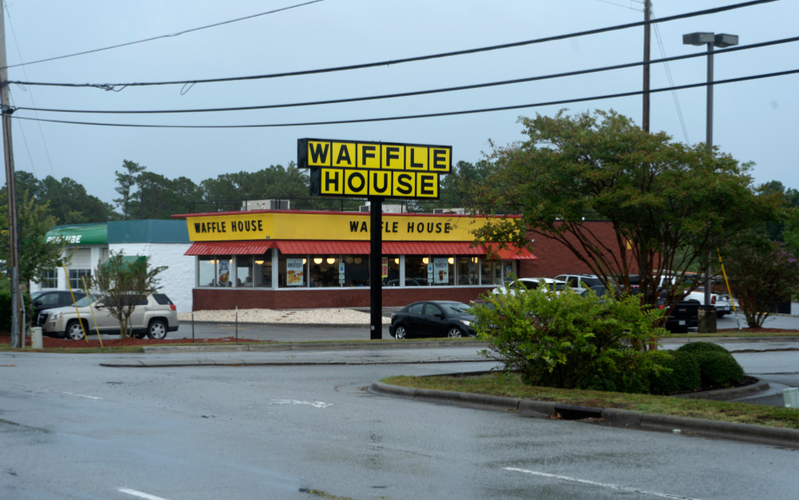The Market’s Beautiful Response to Hurricane Florence
Georgia’s Anheuser-Busch brewery, which produces Budweiser year round, is once again fulfilling its promise to help natural disaster victims by bottling 300,000 cans of clean drinking water in light of Hurricane Florence. The Category 2 storm is expected to have impacted millions on the East Coast, and the brewery is hoping to help quench the thirst of thousands of victims when the time comes. But this isn’t the first time the brewery has paused its normal beer production to help people in need.
Over the past 30 years, Anheuser-Busch donated 79 million cans of emergency water to victims of natural disasters. Recently, the Georgia brewery donated 50,000 cans of water to Hurricane Harvey victims. Now, it’s gearing up to send six truckloads of water to North Carolina and South Carolina, where victims might even experience tornadoes. In addition, another Anheuser-Busch brewery, in Fort Collins, Colorado, also announced it was ready to stop beer production to can drinking water if needed.
Private Provision
To Anheuser-Busch’s CEO, Michel Doukeris, the decision to help those in need was a no-brainer. “For the last 30 years, we have been working with the American Red Cross and our wholesaler partners to provide clean, safe drinking water for communities hit by natural disasters,” he said in a statement. “Putting our production and logistics strengths to work by providing safe, clean drinking water is the best way we can help when disasters strike.”
Such a move, while commendable, is not exclusive to the beer company. After all, private enterprise has long stepped in to help when disaster strikes. In most cases, it does so undeniably better, faster, and more expertly than the government — and without wasting resources and taxpayer dollars in the process.
As economist Peter C. Earle once explained, government rescue efforts are often seen with skepticism thanks to state authorities’ incapacity to be the first to respond to natural disasters. As a matter of fact, he added, government often gets in the way while claiming to be there to help. “Major incidents typically occur with alarming suddenness, too quickly and messily for lumbering bureaucracies to gather information and organize an effective response,” he wrote in 2012. “Only local individuals and small, flexible groups are suited for prompt, decisive reaction.”
That’s why private organizations, often equipped with enough capital to provide free aid when needed, are also faster and better at providing help when tragedy strikes.
The Waffle House Axiom
When Hurricane Harvey hit Texas in 2017, Waffle House restaurants remained open, with McDonald’s, cafes, and other diners also serving meals to the countless victims of the hurricane. The 24/7 comfort-food chain has long been known for never closing down, even when natural disaster strikes. Its policy is so well-established by now that the Federal Emergency Management Agency has a Waffle House Index to measure how bad storm damage is.
Interestingly enough, FEMA is known for doing the exact opposite, as it shut its doors because of “bad weather” one week after Hurricane Sandy devastated New York. After Hurricane Maria devastated Puerto Rico, FEMA struck again, leaving 20,000 pallets of bottled water to go bad on an unused runway in Ceiba, Puerto Rico. FEMA never bothered to coordinate with groups on the ground to make sure the aid made it to those in need.
After Hurricane Florence made landfall, striking North Carolina on Friday, Waffle House once again kept its doors open, even while the hurricane caused at least four deaths. As flash flooding, more heavy rainfall, and forceful winds are expected to continue impacting the region, the local Waffle House restaurants are also expected to remain open. With Anheuser-Busch also stepping in to help, we see the private market, once again, beating the state, providing quick and on-demand help, just as it did before the federal government decided to get in the business of natural disaster help.
Before FEMA, the Market Was Also There
When the Great Chicago Fire of 1871 hit, consuming the city for two days, firefighters were incapable of acting fast enough, prompting business owners and homeowners to step in, becoming the first to fight the growing flames.
In May 1889, the South Fork Dam in Pennsylvania burst. In no time, residents like John Parke abandoned their businesses, mounted their horses, and raced along the flood path to alert residents of the coming danger. The Johnstown Western Union office manager at the time, Hettie Ogle, sacrificed her own life to relay the warnings down the valley. Just before being killed by the flood, she sent her last message to the final station, showing she would rather give up her own life than to ignore her commitment to her community. After the flood had already consumed the region, the army and Red Cross arrived to help days later.
After a massive hurricane hit Galveston, Texas, in 1900, survivors gathered at the Tremont Hotel to coordinate immediate rescue and relief efforts, dealing with the backlash of a hurricane considered more devastating than Katrina completely on their own for days. The Tremont Hotel staff were also said to have provided aid and shelter to everyone who showed up, long before government forces arrived.
And in the aftermath of San Francisco’s devastating 1906 earthquake, while military officers were accused of “despicable behavior” against residents, homeowners were treated as looters and reportedly shot while searching the ruins of their own properties. Despite the government’s horrific response, private business owners did not let their customers down. For example, banker Amadeo Giannini set up a desk in the middle of the street where he continued to take deposits and offer loans, which helped to rebuild the city.
As you can see, long before governments entered the disaster scene, private citizens and entities took responsibility whenever they saw their fellow residents in trouble, oftentimes putting their own safety at risk to help save lives.
In 2018, businesses and private entities now have a great deal more resources to help victims of natural disasters. So when tragedy strikes, they act, never waiting for a government agency to give them the green light.
As Anheuser-Busch’s trucks head to the Carolinas to help hurricane victims, keep in mind that FEMA, a federal agency with a billion-dollar budget, can’t even organize emergency water delivery efficiently, let alone provide the same comfort and shelter that Waffle House can.











